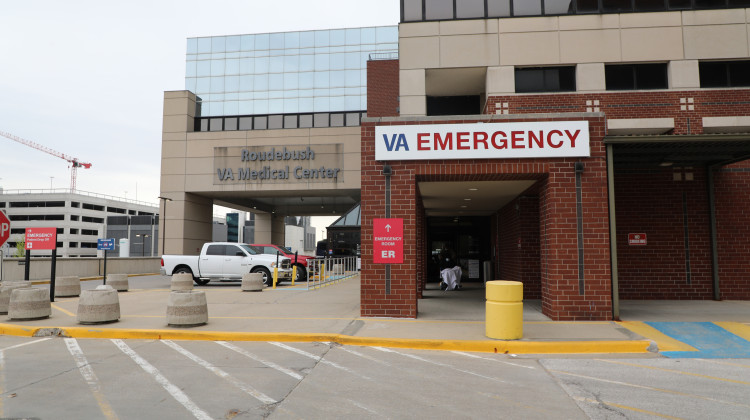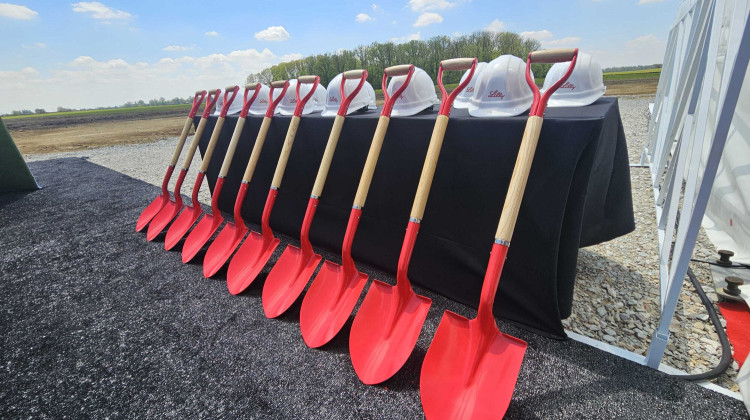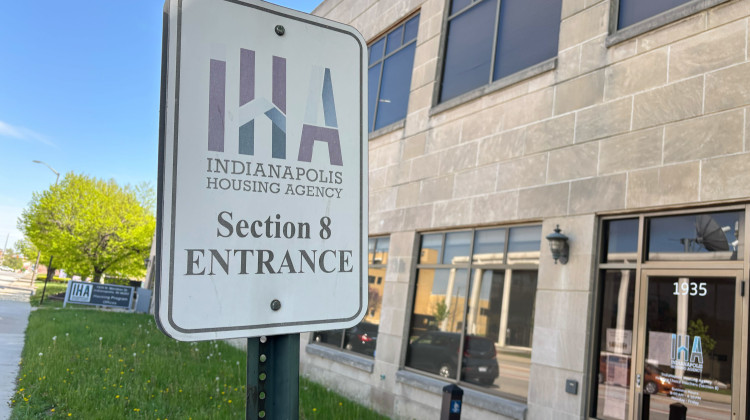
Some Indianapolis VA staff are worried that a return to office will be chaotic and could ultimately lead to patient harm
Ben Thorp / WFYIWorkers at the Indianapolis VA Hospital are required to go back to the office starting on April 14, as part of a new federal policy. The change was announced to VA employees in February, with supervisors already having to report in-person.
But some are raising concerns about the move. They say the change will impact staff and could harm patients.
Emails and PowerPoint slides presented to staff and obtained by WFYI show the VA hospital doesn’t have enough office space. One slide notes that the facility is “300+ work desks shy” of what is needed if all staff are in-person and that there are “ZERO (0) private workspaces.”
Specifically, the back-to-work order impacts all employees within a 50-mile radius of the facility. In one email, staff outside that radius were told to “hang tight” while other options were identified.
Employees have the option of returning to the Roundebush VA Medical Center or several other clinics, including in Brownsburg and Lafayette.
Staff who spoke to WFYI under the condition of anonymity for fear of losing their jobs said they believe the in-person order is part of an effort to get staff to quit.
“We are concerned that anyone unable to find a space in the facility will have an increased risk of being terminated,” one staff member said.
They point to the federal employee buyouts as evidence of efforts to push people to leave government jobs. President Donald Trump has said that many government employees “don’t work at all.”
A broad spectrum of government agencies has already seen cuts and layoffs, spearheaded by the Department of Government Efficiency guided by billionaire Elon Musk.
“This is a commonsense step toward treating all VA employees equally,” said Acting VA Secretary Todd Hunter in a press release on Feb. 3. “Most VA clinical staff don’t have the luxury of working remotely, and we believe the performance, collaboration and productivity of the department will improve if all VA employees are held to the same standard.”
Indiana’s VA health care system annually serves about 62,000 veterans, according to the department. That includes roughly 730,000 outpatient appointments.
A second VA employee who spoke to WFYI said the return to office will be “a huge disaster”.
“And when it's a disaster for employees, there'll be a disaster for patients eventually,” the employee said.
The local VA union also shared a document with WFYI that included comments from staff in response to the return-to-office policy.
In one portion, a VA psychologist said: “I love caring for Vets, but it’s no longer worth it. I already work for less pay, and now I have to drive an hour to sit in (a) random cubicle to do the same thing I was doing in my office at home.”
A registered nurse, who assesses mental health needs of veterans over the phone and was able to do the work remotely, said doing that job in a crowded office with little privacy will make it harder to serve patients. The nurse added that when they raised these concerns, the supervisors told them to consider getting noise cancelling headphones.
“Right now, there will be a minimum of three of us in a shared small space,” the nurse said.
Another registered nurse said it felt clear the administration did not want them to come to work.
“I can easily find a private sector job, but I wanted to take care of fellow Vets,” they said. “I voted for Trump, but I’m not going to work somewhere that promotes having a billionaire IT guy attack their employees while the guy in charge encourages it.”
Craig Vogt is president of the local VA union, AFGE Local 609. He said between now and April 14, some 400 people are expected to switch to in-person work.
“The first day when people return, we're seeing logistic(s) like, not enough computer monitors, internet's not working, that kind of stuff. I think that will impact individual appointments,” he said.
He said he’s not as worried about the immediate impact of the return-to-office policy, but he is more concerned about the long-term impacts, like making VA doctors’ and nurses’ jobs harder due to the logistical challenges.
“My fear is we're scaring off qualified doctors, qualified nurses,” he said. “We're setting the VA for failure down the road, and that combined with the backlog that's going to build due to the lack of staff.”
Vogt believes that government employees at the VA feel belittled. Once people leave, it’ll be hard to get people to come and work at the agency, he said.
“We're not going to be able to get qualified people to fill those positions because who's going to want to work somewhere where they're bragging about return-to-office and lazy federal employees?” he said.
When reached for comment, VA Press Secretary Pete Kasperowicz said the policy was to bring people back “as space permits.”
“(The) VA will make accommodations as needed to ensure employees have enough space to work and will always ensure that Veterans’ access to benefits and services remains uninterrupted as employees return to in-person work,” he said.
Contact WFYI and Side Effects Public Media's Health Reporter Benjamin Thorp at bthorp@wfyi.org.
 DONATE
DONATE






 Support WFYI. We can't do it without you.
Support WFYI. We can't do it without you.